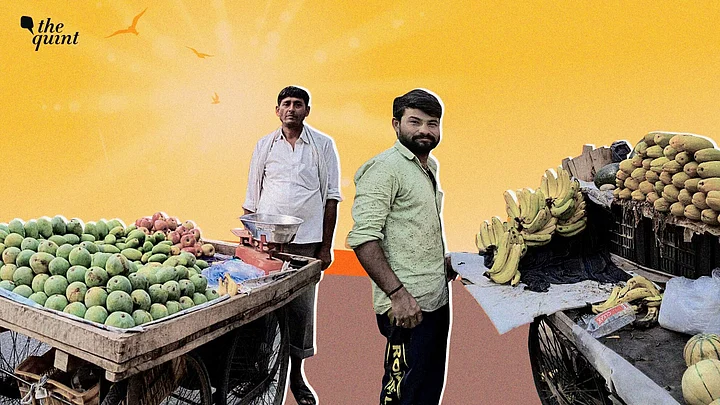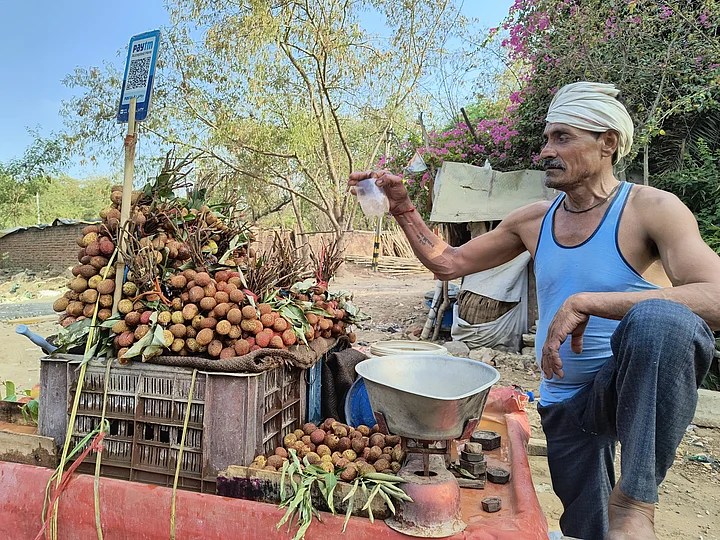Our on-ground climate journalism needs your insights, ideas, and financial support - as we cover the biggest crisis of our times. Become a member so we can bring more such stories to light.
Rehan Khan's day starts at 5 am. The 29-year-old has to travel 26 kilometers to the fruit mandi in Azadpur every other day, before setting up his stall in South West Delhi's Chattarpur area at 9 am.
"I'm out here till 9 pm every day. It's brutal, but I have to do it," he says, as he sprinkles water on the browning bananas and mangoes on his cart. "I have parents and a sister back home who are all dependent on me. This is my only rozgar (source of sustenance)."
The national capital along with large parts of northern India is currently seeing one of the longest and most brutal heat waves yet.
So far over 110 people in India have died of suspected heat-related illnesses, while the National Capital Territory (NCT) including Delhi alone has reported 34 deaths. The real numbers are likely higher.
In this punishing heat, how are those who are forced to spend peak hours outdoors, pushing a cart full of fast-perishing produce, coping?
'The Heat Has Evaporated Our Income'
In another part of the city, The Quint catches up with 45-year-old Muhammad Shafi, another fruit vendor, as he walks out of a residential complex and onto the main road pushing a hand cart full of mangoes.
He says business has taken a massive hit. "People only buy fruits that look absolutely fresh. When the fruits start looking 'ugly' on the outside, no one buys them."
Moreover, he adds that he can't sell them fast enough to keep up with the rate at which the mangoes are rotting. "I am out from 6 am to 10 pm. But I only find a few takers, especially during the day. I manage to make about Rs 500 to Rs 1,000 a day with great difficulty."
According to a recent survey conducted by Greenpeace India, over 50 percent of street vendors in Delhi reported significant income loss, while over 70 percent said that they had experienced a decline in customers due to the heat.
Speaking to The Quint, Mahesh, a 46-year-old vendor in Vasant Vihar who sells vegetables in a residential colony, says, "I would normally get vegetables worth Rs 3,000 - Rs 4,000 daily. Now I can only afford to buy Rs 1,500 - Rs 2,000 worth of vegetables. Out of which, I have to throw away around Rs 300 to Rs 350 worth of produce because they go bad so fast. I barely break even."
"Around 50 percent of the people in this locality who would normally come to buy vegetables don't come anymore. They either order them online or have gone out of station away from the city. And then another 15 percent (of my income and produce) is lost because of rotting."Mahesh, 56
He picks up a wilting cauliflower with brown spots all over it, and says, "See, this cauliflower is worth Rs 100 per kilogram. I just got it yesterday and it's already rotting."
Mahesh goes on to say that the wholesale prices of the produce at the mandis have also skyrocketed. "We used to get coriander for Rs 20 to Rs 30 per kilogram. Now we're getting it for Rs 300 per kilogram. People still expect me to give them out for free. How can I afford to?"
Even seasonal fruits aren't a safe bet.
You would think that tender coconut would sell fast in this sweltering heat, but not fast enough, says Bhura, a 28-year-old vendor who sits by the highway with a measly handkerchief covering his head to protect from the scalding sun.
"This is all the rot," he says, pointing to a dozen or so dried up coconuts stowed away under his seat. On this day (19 June), he says he's made only Rs 400.
Ramveer, a 55-year-old litchi vendor, has a similar story to tell. "Today is a holiday so traffic is sparse too." He says he hasn't sold anything all day (as of 3:30 pm on 17 June). Even on good days now, he says, he barely manages to make over Rs 500.
- 01/02
Ramveer, 55
(Photo: Anoushka Rajesh/The Quint)

- 02/02
Ramveer, 55
(Photo: Anoushka Rajesh/The Quint)

The Impact on Health
The devastating impact of the ongoing heat wave especially extends to the health of those who are forced to spend their days outdoors. Heat-related illnesses including headaches, dizziness, sunburn, and fatigue were reported by almost all the vendors The Quint spoke to.
"I have got rashes all over my back. No matter how much you bathe you don't stop sweating," says Shafi.
When they're at work, there's little they can do to combat the symptoms. "I take disprin when I feel sick, or lie down under some tree for a while to rest. What else can I do?" says Ramveer.
Rehan, on the other hand, says he suffers from frequent headaches. "I just have to bear it," he adds resignedly.
Shafi, who lives in a one-room house with his wife, sons, and daughter-in-law, says that there is little respite even at night time.
"When I get home, things don't get better. It's so hot at night that fans are completely useless. It feels like they're throwing flames."Muhammad Shafi, 45
‘Have No Choice; Hardship Has Become a Habit'
To address the unprecedented climate crisis, Delhi Health Minister Saurabh Bharadwaj, on Wednesday, 19 June, held an emergency meeting where government-run hospitals were asked to scale up beds for patients of heat-related illnesses.
Moreover a heat action plan was implemented in Delhi in April this year which directs government officials to make lists of high-risk areas in the city for focused heat prevention measures including cooling centres and easy access to ice pack dispensaries. However, the plan's impact on the ground is yet to show.
All the street vendors The Quint spoke to said that no government outreach has reached them yet. In the meantime, they have devised their own crude ways to keep themselves and their produce cool.
Ramveer and Rehan who predominantly sell fruits say that sprinkling water on them from time to time helps keep them fresh for longer. On the other hand, Mahesh protects his vegetables by covering them with a wet jute cloth. "It helps somewhat, but not beyond a couple of days," he says.
As for themselves, the vendors say, a cotton cloth around the head, or a make-shift tarpaulin overhang is all the heat protection they can afford.
"I was told that eating raw onion helps prevent heat stroke. I try to keep an onion on hand and eat little bits of it from time to time," says Bhura.
"We have no choice but to be resilient," adds Mahesh. "Our livelihood depends on it."
(At The Quint, we question everything. Play an active role in shaping our journalism by becoming a member today.)

.jpeg?auto=format%2Ccompress&fmt=webp&width=720)
